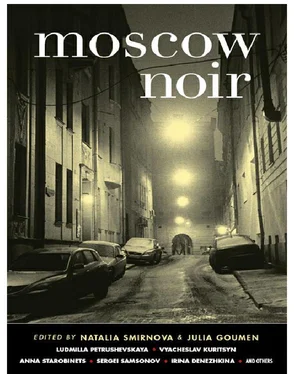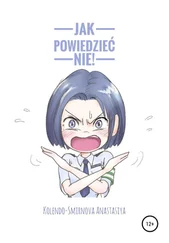“So you mean you want to get back at it?” Veltsev picked at the rug with his finger.
“No, why?” Lana seemed genuinely surprised.
“What do you mean, why?” Veltsev didn’t understand.
Lana didn’t say anything.
“Sorry.”
“Basically, my Sharfik didn’t wait around for his train. My nice new fiancé got iced. They fished him out over there, from the Yauza, past the cemetery.”
“I’m sorry.”
“That’s all right.” She took a long drag. “Everyone’s got their own craziness. Sharfik wanted to move his loot here because he got into some shit. But that’s like jumping from a train after flies. Can you imagine? You throw away everything you have—every last thing—and get out at the first stop.”
“And?” Veltsev propped himself up on one elbow.
“And, well, that’s it, all done.” Lana crushed her cigarette butt in the saucer, lowered her legs from the chair, went out into the front hall, and came back with a photograph, which she tossed down next to him on the bed.
In the crumpled glossy snapshot Veltsev saw a smiling Southern face with a unibrow. The photo had been taken with a flash, close-up, practically point-blank. The face had come out fuzzy, overlit; but above and behind him the little man hanging from the chandelier was etched down to the last detail. On the back of the photo, carefully, like a monogram, a capital III had been written with a felt-tip pen. Veltsev spun the photo in his fingers, tossed it aside, sat down on the edge of the bed, and ran his fist across his forehead.
“What’s up with you?” Lana asked.
Slowly, not quite realizing what he was doing, he got out his wallet, opened it, and looked at its velvety layered insides.
“What’s up with you?” Lana repeated, coming closer.
Veltsev put his wallet away and stared at the floor again. The photograph had reminded him of something important that he’d lost sight of and burned the pit of his stomach, but nothing more specific, so that the next instant he couldn’t even say what exactly had made itself felt—a thing, a memory, a presentiment… ?
Lana picked up the photo, blew on it, and stuck it in the glass of the sideboard.
“Want some tea?” she asked, standing in the door. “Or maybe…”
Veltsev lay down again. “You do your thing there for now.
Turn off the light. I have to… just…”
“Crash, I know,” Lana finished for him, slapped the light switch, and shut herself up in the kitchen.
Collapsing on one elbow, Veltsev lit up and stretched out again. He held the cigarette in an outstretched hand, so the ashes would fall on the floor, and with the other fiddled with his lighter. Soon, he heard an amused muffled voice from the kitchen; Lana was talking on the phone. Veltsev tried to remember the girl’s clumsily made-up face, but instead he envisioned her sweet knee poking out from her robe.
A long time ago, about three years before, he’d come across an article on the Internet which tried to prove that a man’s disposition toward murder and women had their source in the same neurosis—which one exactly, Veltsev never did figure out, though he read the article twice. He was grateful to the author not for his murky verbiage but for the fact that a connection between his inclination for murder and his attraction to women had at least been given some kind of acknowledgment. That is, what he had previously considered something unique to him and had thought of as shameful, like a wet dream, had instantly stopped being either unique or unseemly. After his first contract, he languished a full day, sleepless, and then confessed at the Rozhdestvensky monastery. This act had no consequences for his soul’s salvation, but it had plenty of material results. On the way back from the monastery Veltsev fell asleep at the wheel and rolled his car. His first wife was a medical student who happened to be starting her residency that day at the Sklif. More in the dorm than the Sklif ER, she got Veltsev back on his feet. The next morning it was as if he’d woken up in a new world, and just one week later—with a light heart and even, really, a sense of selfless beneficence—he shot the drunk from Tula who’d been pestering her. He and Oksana got on like a house on fire for two and a half years, and Veltsev called what he brought home as his supposed pay as a personnel inspector for a private security agency their “family income.” Sex (not with any woman, of course, but with the one he considered his ) was better than any confession at washing away his sins. When he was with his woman, he was restored body and soul, and he saw every embrace as the birth of a wonderful new life, a hundred times better than his own and a thousand times better than the ones he took away. For this reason he thought Bonnie and Clyde farfetched. Sexual attraction could not be any great help for heroes in a fight, unless they were homosexuals. And the only justification for a film like Natural Born Killers was that toward the end the bloodthirsty characters turned into loving parents, reborn in their children. He imagined himself and Oksana as loving parents just like that—until the Lord God started bothering her with telephone calls (on the basis of her rich ER practice probably). God always called in Veltsev’s presence. He talked a lot, didn’t answer questions, and before hanging up started wheezing into the receiver. “It’s awful,” his wife admitted guiltily. “I can hear perfectly but can’t make heads or tails of it.” In the six months that passed between the first call and that memorable (for Veltsev) night when the Lord decided to speak through Oksana and she was carted off with seizures to the Kanatchikovaya psych ward, she was able to get the full gist of only two divine revelations: “Everything will be jaga-jaga” and “Boys bloody in the eyes.”
His second marriage, the marriage of Veltsev and Dasha, who did not love him, lasted longer, strangely enough, nearly four years, but fell apart overnight—flew apart in sprays of blood yesterday, at dawn, when, tipped off by an anonymous text message, Veltsev shot the traitor, her lover and his “employer,” Mityai, both of Mityai’s gorillas, Repa and Jack, and the couple sitting on the far side of the screen behind their table. Veltsev had had a bad feeling about this in the fall when he came back from a business trip to St. Petersburg. Dasha, previously willful and hot-tempered, had suddenly softened and become compliant and pleasant. The change in her behavior could have been considered a good sign had it not been simultaneously a sign of infidelity, which destroyed the only thing that tied Veltsev to his wife—the all-renewing and all-forgiving quality of their intimacy. It was amazing, but up until yesterday’s disaster he had laid the blame for the fact that he had ceased to perceive Dasha as his woman not on her but on himself, and had even contemplated, cravenly, divorce. More than twenty-four hours had passed since the slaughter at the club, and he still couldn’t shake the feeling that he’d started to breathe an empty air that was ripping him up inside, like a deepwater fish tossed on shore.
“Don’t hide. I can see you,” he sighed, crushing out his butt on the windowsill. “Come on out.”
The kitchen door, which had been opened just a crack so she could peek through, was flung open, and Lana walked right up to Veltsev. She wasn’t wearing the skullcap anymore and the clown makeup had been wiped clean, and in the thick shadow between the freely swinging sides of her untied robe he saw white, not of her clinging panties but her naked body. Slipping his hand under the robe, Veltsev felt her warm skin, which his touch covered in goose bumps. Lana leaned into him.
Читать дальше












